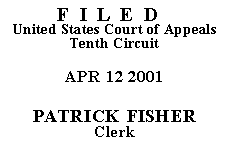

| CLAYTON BRUCE PHILLIPS,
vs.
MICHAEL WILLIAMS, Warden and
ATTORNEY GENERAL FOR THE
STATE OF COLORADO |
|
In 1991, Mr. Phillips was charged in Colorado state court with two counts of aggravated robbery, one crime of violence count, and seven habitual offender counts for the robbery of a fast-food sandwich shop in which $88 was stolen. The court appointed the state public defender to represent him. R. doc. 18 at 2. Mr. Phillips ultimately pled guilty to one count of aggravated robbery and the crime of violence count and was sentenced to twenty-eight years in prison and five years of mandatory parole. R. doc. 3 at 2. Mr. Phillips did not file a direct appeal but, several years later, challenged his Colorado conviction and sentence in collateral proceedings pursuant to Colo. Crim. P. R. 35(c) requesting that he be permitted to withdraw his guilty plea due to ineffective assistance of counsel. His motion was denied and that denial was affirmed on appeal. State v. Phillips, No. 96CA2023, at 1, 9-11 (Colo. Ct. App. Aug. 28, 1997) (unpublished). Mr. Phillips filed the instant federal habeas petition claiming his guilty plea was involuntary and ineffective assistance of counsel. R. doc. 3. The district court found the involuntary plea claim procedurally defaulted, denied the ineffective assistance claim on the merits, and denied a COA. R. doc. 18 at 7, 10-11; R. doc. 23.
Mr. Phillips raises a single issue before this court: ineffective assistance of trial counsel. Aplt. Br. at 16. Mr. Phillips asserts that "counsel's representation fell below an objective standard of reasonableness" and prejudiced his defense, Strickland v. Washington, 466 U.S. 668, 687-88, 694 (1984), for two reasons. First, counsel failed to investigate Mr. Phillips' assertions that he had received a large sum of money the day of the robbery and failed to interview any exculpatory witnesses. Second, counsel erroneously instructed Mr. Phillips that if he pled guilty he could not be extradited to another state prior to the conclusion of his Colorado sentence. Aplt. Br. at 15.
On federal habeas review, we must deny relief unless the state court decision "was contrary to, or involved an unreasonable application of, clearly established Federal law, as determined by the Supreme Court of the United States," 28 U.S.C. § 2254(d)(1), or "was based on an unreasonable determination of the facts in light of the evidence presented in the State court proceeding," id. § 2254(d)(2); see also Williams v. Taylor, 529 U.S. 362, 412-13 (2000). Because the Strickland two-part test applies to guilty pleas, Mr. Phillips must show not only that his counsel's representation fell below an objective standard of reasonableness, but also that "there is a reasonable probability that, but for counsel's errors, he would not have pleaded guilty and would have insisted on going to trial." Hill v. Lockhart, 474 U.S. 52, 59 (1985).
The Colorado Court of Appeals held that counsel's lack of investigation was reasonable given that Mr. Phillips "did not indicate what the substance of 'other people's' testimony would have been or what information the investigation would have revealed, other than that he had a substantial sum of money the day of the robbery." Phillips, No. 96CA2023, at 7-8. As for counsel's erroneous advice, the state court found that no promises were made to Mr. Phillips regarding sentencing and that "defendant was subject to prosecution in the other states before he pleaded guilty in this case. This circumstance did not change when defendant entered his guilty plea. Thus, the plea here did not give rise to any potentially adverse consequences that otherwise would not have existed." Id. at 10-11. According to the state court, the "defendant failed to establish that he had received ineffective assistance of counsel or that any alleged inadequacies of counsel's performance prejudiced his defense." Id. at 9-10. This resolution does not constitute an unreasonable application of Strickland. See Williams, 529 U.S. at 411-12.
We DENY Mr. Phillips' motion to proceed in forma pauperis, DENY his request for a COA and DISMISS this appeal.
Entered for the Court
Paul J. Kelly, Jr.
Circuit Judge
*. This order and judgment is not binding precedent, except under the doctrines of law of the case, res judicata, and collateral estoppel. This court generally disfavors the citation of orders and judgments; nevertheless, an order and judgment may be cited under the terms and conditions of 10th Cir. R. 36.3.
2. After examining the briefs and the appellate record, this three-judge panel has determined unanimously that oral argument would not be of material assistance in the determination of this appeal. See Fed. R. App. P. 34(a); 10th Cir. R. 34.1 (G). The cause is therefore ordered submitted without oral argument.